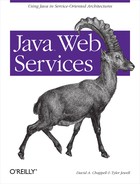There are certainly enough interoperability issues to worry about in the present. Unfortunately, they aren’t the entire story. A number of other issues are poised to become a problem as web services standards continue to develop.
Several extensions, such as security and reliability, are necessary to complete the web services picture. However, standards bodies have not yet decided where these extensions belong. IBM has proposed HTTPR (reliable HTTP), while other participants in web services standards development disagree about whether reliability belongs at the transport protocol level. ebXML has added reliability in their message protocol standard. The same issue exists for security (some of these issues are discussed in Chapter 10) and quality of service (QoS).
Currently, the W3C and other standards bodies are trying to identify which gaps in the web services standards most need to be filled. Reliability and security are mentioned most often, but beyond that, there is no consensus about which missing standards are most critical or what the list should even include. Standards groups are not coordinated as they try to address these gaps, so a proliferation of competing standards often duplicates or overlaps. This proliferation will undoubtedly cause additional interoperability issues to surface. To add to the confusion, vertical markets often create their own standards to expedite business exchange within (or between) markets.
The result is that the most widely implemented standard usually wins, whether or not it represents the best solution. However, until the dust settles, interoperability will become more of a nightmare as web services implementations increasingly require a level of sophistication beyond the existing ubiquitous standards such as SOAP, XML, and HTTP. Here is is an overview of some of the developing standards that could have an effect on the interoperability challenge:
In April 2001, the W3C held a Web Services Workshop, during which a number of presentations proposed work items for the W3C. The following working groups were identified (in order of priority):
New Wire working group XML protocol extensions (QoS, reliable messaging, attachments, messaging models, routing, and publish/subscribe)
Definition language (conversation, QoS, security, representation for business process and state changes, contracts, and negotiation)
Orchestration (conversations, work flow, and business process)
Discovery/Registration (generic query language and expression of vocabularies/terminologies)
Management
Architecture Group (security and QoS)
Coordination Group (including external groups)
The ebXML effort, initiated jointly by OASIS and UN/CEFACT, is developing standards in a number of areas, including:
Messaging (based on SOAP with reliability, intermediaries, and some security)
Business process
Collaboration party profiles and party agreements
Security Assertion Markup Language (SAML)
Business Transaction Processing (BTP)
Universal Business Language (UBL—business process)
Web Services for Interactive Applications (WSIA—previously the Web Services Component Model [WSCM])
There has been some call for standardized interoperability. This standard would include definitions of interoperability requirements between deployment environments and strong conformance statements as part of the standards.[14]
Another proposed idea is that layers of SOAP interoperability should be defined with a minimal SOAP implementation and several extended implementations scoped above the minimum (for example, base SOAP plus reliability). The ebXML Message Specification has taken this approach in their latest draft (2.0). One argument against this approach is that the goal is to encourage open communication among implementations; defining optional subsets increases the risk of interoperability problems.
[14] As we go to press, BEA, IBM, and Microsoft are forming the Web Service Interoperability Organization, which will address some of these issues. Given the existence of the SOAPBuilders Ineteroperability Labs, the formation of this group raises the spectre of interoperability between different interoperability groups.
